
The administrative units of Pakistan comprise four provinces, one federal territory, and two disputed territories: the provinces of Punjab, Sindh, Khyber Pakhtunkhwa, and Balochistan; the Islamabad Capital Territory; and the administrative territories of Azad Jammu and Kashmir and Gilgit–Baltistan. As part of the Kashmir conflict with neighbouring India, Pakistan has also claimed sovereignty over the Indian-controlled territories of Jammu and Kashmir and Ladakh since the First Kashmir War of 1947–1948. It also has a territorial dispute with India over Junagadh, but has never exercised administrative authority over either regions. All of Pakistan's provinces and territories are subdivided into divisions, which are further subdivided into districts, and then tehsils, which are again further subdivided into union councils.
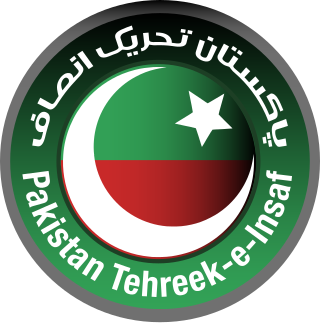
The Pakistan Tehreek-e-Insaf is a political party in Pakistan established in 1996 by Pakistani cricketer and politician Imran Khan, who served as the country's prime minister from 2018 to 2022. The PTI ranks among the three major Pakistani political parties alongside the Pakistan Muslim League–Nawaz (PML–N) and the Pakistan People's Party (PPP), and it is the largest party in terms of representation in the National Assembly of Pakistan since the 2018 general election. With over 10 million members in Pakistan and abroad, it claims to be the country's largest political party by primary membership, as well as one of the largest political parties in the world.
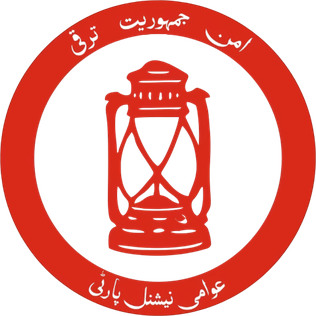
The Awami National Party is a Pashtun nationalist, secular and leftist political party in Pakistan. The party was founded by Abdul Wali Khan in 1986 and its current president is Aimal Wali Khan, great-grandson of Bacha Khan, with Mian Iftikhar Hussain serving as the Secretary-General. Part of the PPP-led cabinet of the Pakistani government during 2008−13, ANP's political position is considered left-wing, advocating for secularism, public sector government, and social egalitarianism.
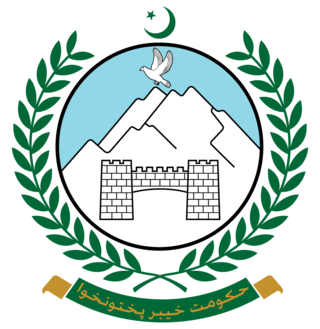
The Government of Khyber Pakhtunkhwa, is the provincial government of the Pakistani province of Khyber Pakhtunkhwa. Its powers and structure are set out in the provisions of the 1973 Constitution, in which 32 districts come under its authority and jurisdiction. The government includes the cabinet, selected from members the Khyber Pakhtunkhwa Assembly, and the non-political civil staff within each department. The province is governed by a unicameral legislature with the head of government known as the Chief Minister. The Chief Minister, invariably the leader of a political party represented in the Assembly, selects members of the Cabinet. The Chief Minister and Cabinet are thus responsible the functioning of government and are entitled to remain in office so long as it maintains the confidence of the elected Assembly. The head of the province is known as the Governor, appointed by the federal government, on behalf of the President, while the administrative boss of the province is Chief Secretary Khyber Pakhtunkhwa.
Law enforcement in Pakistan is one of the three main components of the criminal justice system of Pakistan, alongside the judiciary and the prisons. The country has a mix of federal, provincial and territorial police forces with both general and specialised functions, but the senior ranks of all the provincial forces and most of the federal ones are manned by members of the Police Service of Pakistan (PSP). The PSP is one of the most prestigious part of the Central Superior Services, Pakistan's main civil service organisation. Federal law enforcement agencies are generally overseen by the Ministry of Interior of the Government of Pakistan, while provincial police forces are overseen by a department of the government of that province.

Shahram Khan Tarakai is a Pakistani politician who was Provincial Minister of Khyber Pakhtunkhwa of Local Government, Elections and Rural Development, in office from 29 August 2018 till 26 January 2020. He is currently a member of the National Assembly of Pakistan since February 2024 and had been a member of the Provincial Assembly of Khyber Pakhtunkhwa from August 2018 till January 2023.
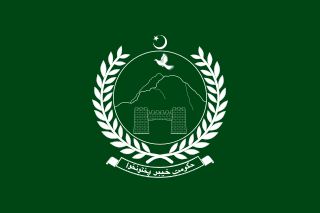
The Provincial Assembly ofKhyber Pakhtunkhwa is a unicameral legislature of elected representatives of the Pakistani province of Khyber Pakhtunkhwa, which is located in Peshawar, the provincial capital. It was established under Article 106 of the Constitution of Pakistan, having a total of 145 seats, with 115 general seats, 26 seats reserved for women and 4 reserved for non-Muslims.
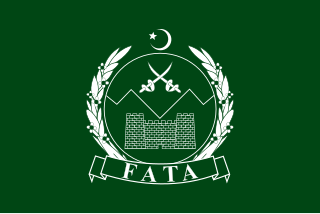
The Federally Administered Tribal Areas, commonly known as FATA, was a semi-autonomous tribal region in north-western Pakistan that existed from 1947 until being merged with the neighbouring province of Khyber Pakhtunkhwa in 2018 through the Twenty-fifth amendment to the constitution of Pakistan. It consisted of seven tribal agencies (districts) and six frontier regions, and were directly governed by the federal government through a special set of laws called the Frontier Crimes Regulations.

Pervez Khan Khattak is a Pakistani politician who served as the Minister of Defence from August 2018 until April 2022. He had been a member of the National Assembly of Pakistan from August 2018 till January 2023. Prior to that, he served as the 22nd Chief Minister of Khyber Pakhtunkhwa from 2013 to 2018, elected to the Provincial Assembly from Nowshera District. He was a senior member of the Pakistan Tehreek-e-Insaf until July 2023, when he formed his breakaway faction, the Pakistan Tehreek-e-Insaf Parliamentarians (PTI-P). On 12 February 2024, he left the chairmanship of the PTI-P and took a break from politics tenders resignation as PTI-P chairman due to ‘health issues’.

The Pervez Khattak administration was the coalition of provincial government of Khyber Pakhtunkhwa between Pakistan Tehreek-e-Insaf (PTI), the Islamist Jamaat-e-Islami (JI), Qaumi Watan Party (QWP), and Awami Jamhuri Ittehad Pakistan (AJIP). AJIP later merged itself with PTI.

Manglawar is an administrative unit, known as Union council of Tehsil Babuzai, of Swat District in the Khyber Pakhtunkhwa province of Pakistan and former capital of Kingdom of Swat. It is located at 34°48'30.7"N 72°25'50.0"E with an average altitude of 987 meters.
Shakeel Ahmad is a Pakistani politician who was the Provincial Minister of Khyber Pakhtunkhwa for Revenue, in office from 29 August 2018 till 26 January 2020. He is currently a member of the Provincial Assembly of Khyber Pakhtunkhwa as a member of the Pakistan Tehreek-e-Insaf since 28 February 2024. Prior to that Shakeel was a member of the Provincial Assembly of Khyber Pakhtunkhwa from 2013 to 2018 and from 2018 to 2023. He has served as the Minister for Public Health Engineering. He also served as Provincial Minister for Communication & Works in the 2024 Gandapur ministry but resigned over controversy in August 2024.

Provincial elections were held in the Pakistani province of Khyber Pakhtunkhwa to elect the members of the 10th Provincial Assembly of Khyber Pakhtunkhwa on 11 May 2013, alongside nationwide general elections and three other provincial elections in Sindh, Balochistan and Punjab. The remaining two territories of Pakistan, AJK and Gilgit-Baltistan, were ineligible to vote due to their disputed status.
Pabbi is a tehsil located in Nowshera District, Khyber-Pakhtunkhwa, Pakistan. The tehsil is named after the Pabbi town, which is located on the GT Road.

Mahmood Khan is a Pakistani politician who was the Chief Minister of Khyber Pakhtunkhwa from August 2018 till January 2023 and a member of the Pakistan Tehreek-e-Insaf (PTI). He had been a member of the Provincial Assembly of Khyber Pakhtunkhwa from August 2018 till January 2023, when he, as Chief Minister, dissolved the Assembly. His tenure as Chief Minister saw various healthcare initiatives surrounding the Sehat Insaf Card, where he primarily focused on expanding the card to achieve universal free healthcare.
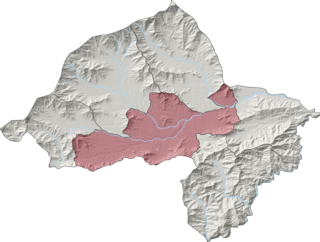
Khar Bajaur Tehsil, sometimes shortened to Khar Tehsil, is an administrative subdivision (tehsil) of Bajaur District in Khyber Pakhtunkhwa, Pakistan. Khar Bajaur is the second largest of Bajaur District's seven tehsils.
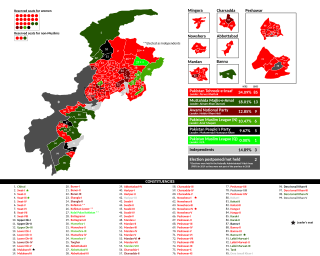
Provincial elections were held in the Pakistani province of Khyber Pakhtunkhwa on 25 July 2018 to elect the members of the 11th Provincial Assembly of Khyber Pakhtunkhwa, alongside nationwide general elections and three other provincial elections in Sindh, Balochistan and Punjab. The remaining two territories of Pakistan, AJK and Gilgit-Baltistan, were ineligible to vote due to their disputed status.
The North-West Frontier Province Local Government Ordinance, 2001, or the Khyber Pakhtunkhwa Local Government Ordinance, 2001 was an ordinance passed by the Provincial Assembly of North-West Frontier Province on 14 August 2001, as part of a series of local government ordinances prepared by the National Reconstruction Bureau passed together by each of the four provinces at the time.

The Twenty-fifth Amendment to the Constitution of Pakistan was passed by the Parliament of Pakistan and the Khyber Pakhtunkhwa Assembly in May 2018. Under the amendment, the Federally Administered Tribal Areas (FATA) and Provincially Administered Tribal Areas (PATA) are to be merged with the province of Khyber Pakhtunkhwa (KP).
The Pakistan Levies, or Federal Levies, are provincial paramilitary forces (gendarmeries) in Pakistan, whose primary missions are law enforcement, assisting the civilian police in maintaining law and order, and conducting internal security operations at the provincial level. The various Levies Forces operate under separate chains of command and wear distinct patches and badges.















